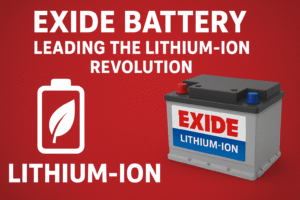India is witnessing a rapid transformation in the way energy is produced, stored, and consumed. With the government’s strong push for electric mobility and renewable energy integration, the demand for advanced energy storage solutions is soaring Amid this transition, Exide Battery, a trusted name in power solutions for decades, is taking bold strides to establish itself as a leading player in the lithium-ion battery market. Known for reliability in lead-acid batteries, Exide is now channeling its expertise, investments, and global partnerships to power India’s clean energy future.

From Legacy to Leadership in Lithium-Ion
For years, Exide battery (exide industries) has been synonymous with durability and performance in lead-acid batteries, serving automobiles, homes, industries, and telecom sectors. However, with changing energy demands and global trends, Exide recognized early on that lithium-ion batteries would dominate the next era of energy storage. Unlike conventional batteries, lithium-ion technology offers higher energy density, longer life cycles, faster charging, and lighter weight—making it the backbone of electric vehicles (EVs) and renewable energy storage systems.
Exide’s pivot into lithium-ion is not just a business decision; it is part of a larger vision to align with India’s sustainability goals and reduce dependence on imported battery technologies.
The Bengaluru Gigafactory – Exide battry’s Landmark Project
A major milestone in this journey is the establishment of Exide Energy Solutions Ltd (EESL), a wholly-owned subsidiary focused exclusively on lithium-ion manufacturing. EESL is building a 12 GWh gigafactory in Bengaluru, Karnataka, which is expected to be one of India’s largest integrated lithium-ion cell manufacturing facilities.
-
Phase 1 Capacity: 6 GWh, targeted to go live by FY26.
-
Total Investment: Around ₹6,000 crore, marking one of the biggest commitments by an Indian company in the battery sector.
-
Technology Focus: Production of both Lithium Nickel Manganese Cobalt (NCM) and Lithium Iron Phosphate (LFP) cells.
-
Product Range: Cylindrical and prismatic cells in multiple formats such as 4.2 Ah, 5 Ah, 106 Ah, 157 Ah, and 228 Ah.
This facility will cater to electric vehicles, renewable energy storage, telecom, and industrial applications, reducing India’s reliance on imported cells.
Joint Venture in Gujarat: Nexcharge
Exide’s lithium-ion ambitions are not limited to cell manufacturing. In a significant step, the company partnered with Leclanché SA, a Swiss energy storage giant, to form Nexcharge—a joint venture dedicated to making advanced battery packs and modules.
-
Location: Prantij, Gujarat.
-
Capacity: 1.5 GWh installed capacity, one of the largest pack and module assembly facilities in India.
-
Technology: Six fully automated assembly lines to produce high-performance battery packs for EVs and energy storage.
-
Ownership: Exide holds an 84.9% stake, demonstrating its strong commitment to the venture.
This JV combines Exide’s deep market presence in India with Leclanché’s expertise in lithium-ion technology, creating a powerful synergy to supply world-class battery solutions to Indian and global markets.
Strategic Collaborations – Hyundai & Kia
To strengthen its market leadership, Exide has also partnered with Hyundai Motor Co. and Kia Corp. under an MoU for the supply of locally produced lithium-ion LFP cells. This collaboration is crucial for the Indian EV ecosystem as it enables localized production, reduces import dependency, and ensures competitive pricing for EV batteries.
Such partnerships highlight Exide’s ability to not only invest in technology but also align with leading global automotive players to accelerate EV adoption in India.
Why Exide Lithium-Ion Batteries Matter
Exide’s lithium-ion solutions bring multiple benefits across applications:
-
Electric Vehicles (EVs): Longer driving range, lightweight design, and fast charging.
-
Home & Commercial Storage: Efficient storage of solar and renewable energy for uninterrupted power supply.
-
Industrial Applications: Reliable backup for data centers, telecom, and UPS systems.
-
Hybrid Systems: Integration into renewable and grid-based hybrid solutions.
Commitment to Sustainability
Exide’s investments in lithium-ion technology are also aligned with India’s green energy goals. By localizing cell and pack production, the company is reducing carbon footprints, creating jobs, and contributing to Atmanirbhar Bharat (self-reliant India). Moreover, with recycling and eco-friendly practices, Exide ensures that its future growth remains sustainable.
Conclusion
From its gigafactory in Bengaluru to its Nexcharge JV in Gujarat, and strategic collaborations with global automakers, Exide Battery is transforming itself into a major force in India’s lithium-ion revolution. With billions in investment, cutting-edge technology, and a trusted brand name, Exide is not just adapting to the future of energy—it is leading it.
As electric vehicles and renewable energy become mainstream, Exide’s leadership in lithium-ion will play a critical role in shaping India’s clean energy landscape for decades to come.
The above is for infomation regading future in enerfy storage and renewable sector only.
Leave a Reply